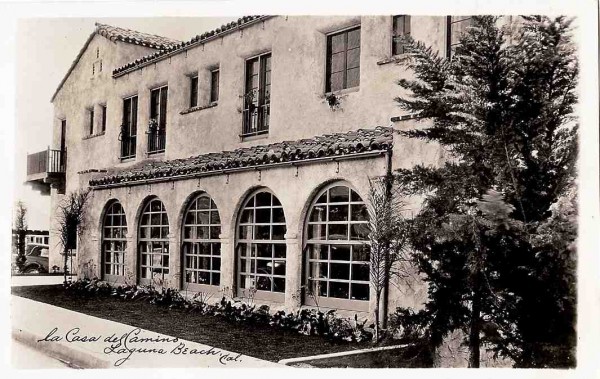By Anders Lasater, Special to the Independent
Saturday, Jan. 26, 2008, marked the 79th anniversary of the grand opening of the La Casa del Camino. While the current hotel’s owners tout its “exquisite old-world charm,” in 1929 the establishment was heralded as “Laguna’s first modern hostelry,” and its advent was followed with great interest in the town’s early paper, the South Coast News. Articles offered updates on the hotel’s physical progress, the venture’s artistic aspects and the notable community members involved.
La Casa Del Camino was built by local artist and councilman William W. Riddell, who envisioned it as a much-needed center for culture and community. A Jan. 25, 1929, article explains: “The desire for a modern hotel has been based on needs repeatedly brought to the attention of civic bodies, and repeatedly embodied by them in programs of improvements as among the city’s greats needs…The completed structure is an asset to the city.”
In the same edition of the paper, a number of prominent locals and businesses took out ads offering congratulations to the Riddells. One by Citizens Bank described the hotel’s completion “a turning point in our city’s history.” Other well-wishers included Mr. and Mrs. Andrew Ryan of Pat Ryan Grocery and Confectionery, Joseph and Marie Thurston, Umbarger Construction Company, Charles Covern-Bakery and Confectionery Store, E. E. Jahrus of Laguna Beach Realty, Laguna Beach Boy’s Academy and Citizens Bank of Laguna Beach.

The new hostelry was not just a modern convenience, but, according to a Feb. 1, 1929, story, the “building itself is a work of art,” and its color scheme “carried out in the most daring fashion.” Its builder was Umbarger Construction Company, which had built the Hollywood Franklin Hotel and Hall of Justice in Los Angeles. Riddell wanted a quality building, whose construction equaled other major civic structures.
The opening itself was considered the most important social event in the town’s history and nearly the entire population turned out along with many other Southern California visitors, who came to the opening reception and dance put on by Mr. and Mrs. Riddell. Fourteen paintings of “Old Laguna” by plein air artist Joseph Kleitsch were exhibited in the lobby and dining room.
The who’s who of artists attending the event included William Wendt, Karl Yens, Thomas L. Hunt, Clarence Hinkle, Frank W. Cuprien, Miss Edith Loop, Miss Alice Fullerton, Miss Julie Raymond, Mrs. Ida Randall Bollos, William A. Griffith, Miss Anna A. Hills, Miss Virginia Woolley and William Swift Daniell.
The cost for a stay in this establishment? Single rooms without bath were $2 to $3, and single rooms with bath were $2.50 to $3.50.
In a remarkable contrast, none of the fanfare that surrounds the opening of La Casa del Camino is summoned when the Coast Inn opens just four months later, a testament to Riddell’s stature and influence with the local press.
Within a month of the hotel’s opening, the La Casa del Camino Café also opened for business, operated by Mrs. Clara I. Brisbin and Miss Carol Brisbin, who had responded to an advertisement that the dining room was available for lease with “very reasonable rent to competent lessee.”
The restaurant’s formal opening, held under the auspices of the Chamber of Commerce, included a seven-course dinner, to be followed by entertainment, for the price of $1.50 per ticket. A March 15 article mentions that while the chamber would convene their meeting at the time of the opening, they would “make no attempt at conducting business.”
Various local dignitaries spoke at the café’s opening, including J. Frank Burke, owner and editor of the Santa Ana Register; P.C. Pemberton, president of the chamber; Mayor Frank B. Champion; City Attorney Moresby White; Al Burns, head of the Lions Club; and, of course, Riddell. The list of those in attendance reads like a real who’s who in Laguna.
The chef for the new eatery was George W. Coover, the former chef of Tea & Tiffin. Shortly after the café opened, the Woman’s Club announced a change in venue for their regular meeting from Tea & Tiffen to La Casa del Camino Café. Other clubs did the same.
La Casa del Camino enjoyed its reputation as a popular hotel for out-of-town visitors and a local venue for meetings and social events on into the 1950s. In its heyday it drew members of the Hollywood crowd, many of whom stayed at the hotel during the making of films such as “All’s Quiet on the Western Front” and “Evangeline.”
The hotel experienced a change during the 1960s and ‘70s when it evolved into a popular hang out for local surfers and hippies and deteriorated into a ghost of its former self. Owner Maria Price operated it as studio apartments and then as a bed and breakfast from the early 1970’s through the 1990s under the name of Hotel Firenze.
In the mid-90s, businessman and builder Dilesh Patel restored much of the hotel’s earlier charm as well as its original name, La Casa del Camino, in a painstaking 1996 renovation.
La Casa del Camino is currently co-owned by Christopher Keller, who took over in 2002 and shares the vision of the original owner, William W. Riddell, of the hotel as focal point of community life.
Architect Anders Lasater wrote and compiled La Casa del Camino history on behalf of Keller, relying on newspaper archives in the Laguna Beach Library.




